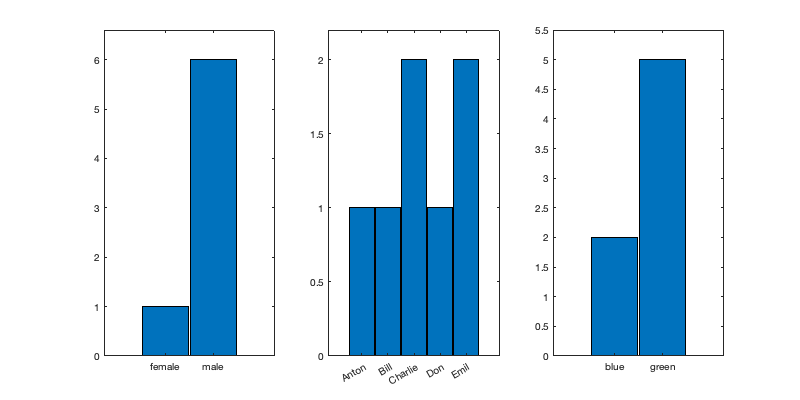PandasToMatlab
Pandas<->Matlab
The functions are designed to convert Pandas DataFrames and Series to Matlab and back. Function df2t converts DataFrames and Series to Matlab in memory w/o saving anthing to the disk, while t2df converts Table to DataFrame.
Make sure to set up Python in Matlab
pe = pyenv;
if pe.Status == "NotLoaded"
[~,exepath] = system("where python");
pe = pyenv('Version',exepath);
endCreate a simple dataframe from json and convert to Table
jsonData = "{'gender': (['male'] * 6)+['female']," + ...
"'name': ['Anton', 'Bill', 'Charlie', 'Don', 'Emil', 'Emil', 'Charlie']," +...
"'eye_color': ['blue', 'green', 'green', 'green', 'blue', 'green', 'green']}";
df = py.pandas.DataFrame(py.eval(jsonData, py.dict()));
testTable = df2t(df);
% plot the statistics
figure("Color","white", "Position", [0,0,800,400])
subplot(1,3,1), hist(categorical(testTable.gender))
subplot(1,3,2), hist(categorical(testTable.name))
subplot(1,3,3), hist(categorical(testTable.eye_color))Create a Table and convert it to DataFrame
% then use Pandas to sample from it and create new dataframe, and convert it to Table
Name = {["Roger", "Sanchez"];
["Paul", "Johnson"];
["Lisa", "Li"];
["Don", "Diaz"];
["Havana ", "Brown"]};
Age = [38;43;38;40;49];
Smoker = logical([1;0;1;0;1]);
Height = [71;69;64;67;64];
Weight = [176;163;131;133;119];
BloodPressure = [124 93; 109 77; 125 83; 117 75; 122 80];
T = table(Name,Age,Smoker,Height,Weight,BloodPressure);
T.BMI = (T.Weight * 0.453592)./(T.Height * 0.0254).^2;
df = t2df(T);
% Sample from the dataframe
df_sampled = df.sample(int64(10), replace=true);
table_sampled = df2t(df_sampled)Convert a Series to Table
% Create a Series of random integers using numpy.random and convert to table
rng = py.numpy.random.RandomState(int64(42));
integers = rng.randint(int64(0), int64(10), int64(4));
pySeries = py.pandas.Series(integers, pyargs('name', 'integers'));
matSeries = df2t(pySeries)% Create a Series of random integers using Matlab rand with letters as indexes
% and convert to Matlab.
pySeries = py.pandas.Series(rand(1,4), pyargs('name', 'real','index', {'a', 'b', 'c', 'd'}));
df2t(pySeries)% Create a Series of strings
data_list = {"Jeff Bezos", "Elon Musk",...
"Bernard Arnault", "Bill Gates", "Warren Buffett"};
pySeries = py.pandas.Series(data_list, pyargs('name', 'Billioners','index', int64([1:numel(data_list)])));
billioners = df2t(pySeries);
billioners([2:3],:)Related Utilities
py2mat.m
and
mat2py.m
convert generic Python variables to Matlab variables and vice versa.
Citar como
Artem Lensky (2025). PandasToMatlab (https://github.com/Lenskiy/PandasToMatlab/releases/tag/v0.23), GitHub. Recuperado .
Compatibilidad con la versión de MATLAB
Compatibilidad con las plataformas
Windows macOS LinuxEtiquetas
Community Treasure Hunt
Find the treasures in MATLAB Central and discover how the community can help you!
Start Hunting!Descubra Live Editor
Cree scripts con código, salida y texto formateado en un documento ejecutable.
| Versión | Publicado | Notas de la versión | |
|---|---|---|---|
| 0.23 | See release notes for this release on GitHub: https://github.com/Lenskiy/PandasToMatlab/releases/tag/v0.23 |
||
| 0.21 | See release notes for this release on GitHub: https://github.com/Lenskiy/PythonToMatlab/releases/tag/v0.21 |







